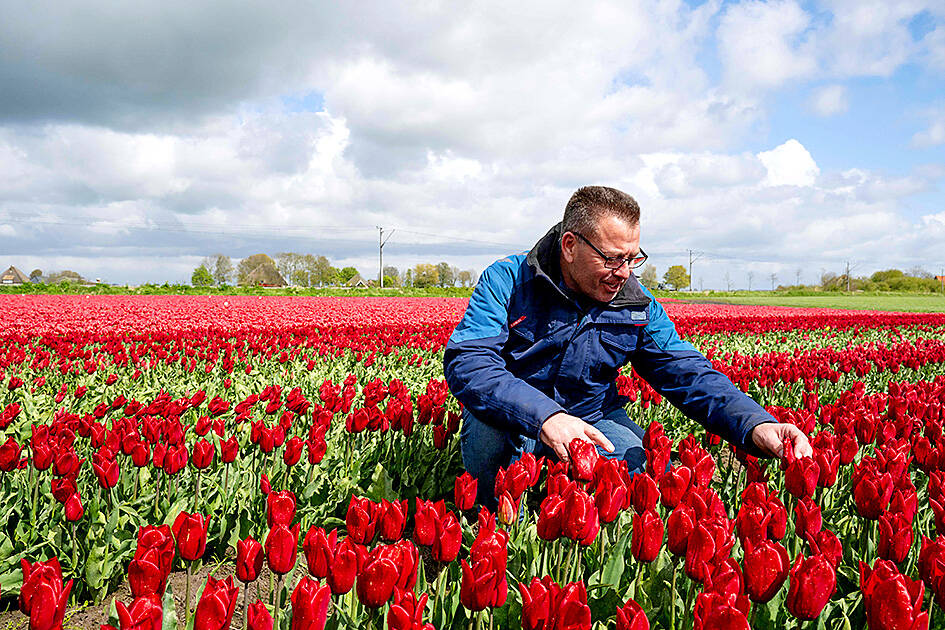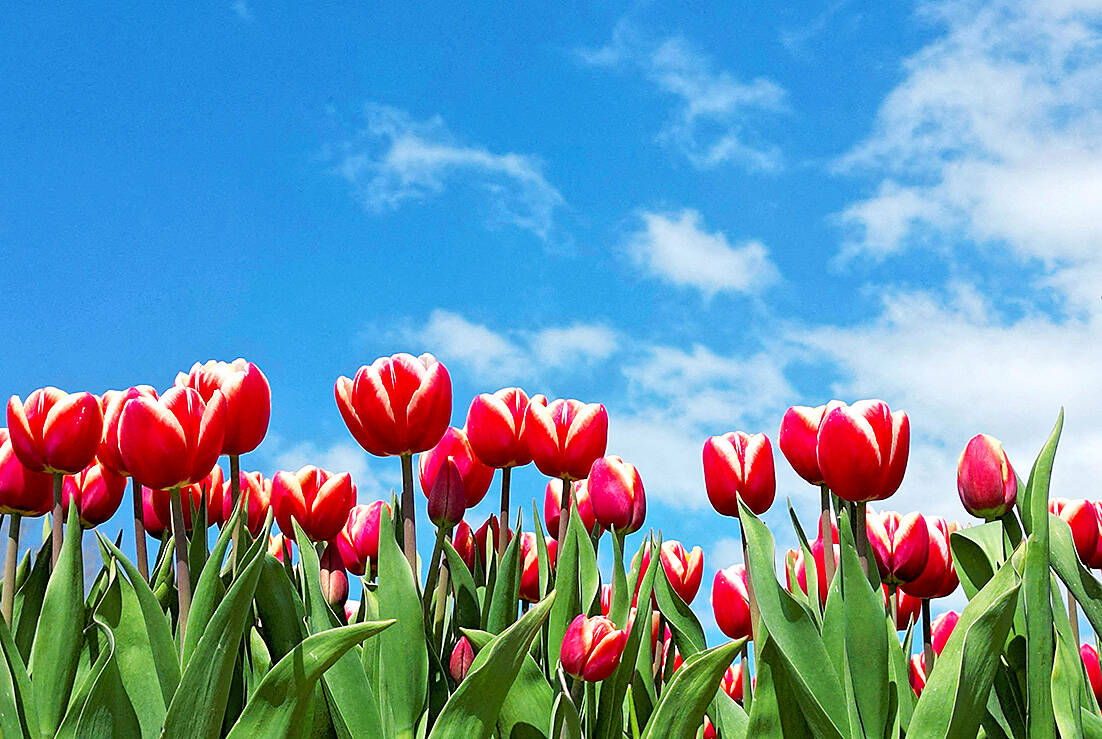Arjan Smit gazes out over his tulip fields, a riot of red and pink flowers he has cultivated all his adult life and part of a family business his grandfather started in 1940.
The 55-year-old has seen many changes over a long career but he says climate change is making an all-consuming profession even harder.
“The climate has changed. We can feel that. We have more wet periods. Last year, it was just raining, raining, raining and you can see the result,” he said.

Photo: AFP
From a distance, the fields of Smitflowers are a picture-perfect row of flowers, the type found on Dutch tourist brochures that attract visitors from around the world.
But he also pointed to muddy gaps, where tulips have fallen victim to the rain.
“It’s sometimes hard. Last winter, it was very wet. In total in our sector, we lost around eight to nine percent of the bulbs in the field. They were killed by water,” said Smit.

Photo: Reuters
“And we planted four percent fewer. That means we are now starting to harvest our bulbs but we have lost a minimum of 13 percent of the new bulbs for next year.”
As the world heats up, the atmosphere contains more water vapor, meaning wetter winters.
And rising temperatures mean hotter spring and summer periods in the Netherlands — a deadly combination for tulip farmers.
“When I started this work around 30 years ago, we had to water (the fields) two to four times in a (spring) season,” said Smit.
“In the last 10 years, sometimes we have to water every week. That means 10 times... It’s much more expensive. That’s sometimes hard,” he said.
‘DIFFICULT SITUATION’
Smit produces 11 million tulips of all different varieties in a year-round operation combining natural cultivation with a huge greenhouse and cool room system in the winter.
Lining his office walls are pictures of Smit flowers in famous hands, including him offering a bouquet to Queen Maxima.
“King Willem-Alexander was really jealous,” he grinned.
But the challenges for Smit and his trade were laid bare in late April, when sun, biting wind, torrential rain and hail all came in one single day.
This all adds up to a “difficult situation” for the tulips at the moment, explained Smit.
As the winter was so wet, the roots did not grow down far enough in search of water, with a knock-on effect for the summer.
“I’m very afraid now... that in a warm period they will not have enough roots to drink all the water they need and they will die again and we will have a very bad harvest period.”
The answer for Smit and his 18 staff is constant vigilance.
“All we can do to adapt (to climate change) is to be awake 24/7, to see what is happening with your products on the field, what they need,” he said.
‘CATASTROPHIC’
If climate change is a longer-term challenge, Dutch tulip farmers are fretting about an even more imminent threat — increased Brexit border controls.
Since yesterday, physical checks are now required for many plants and flowers entering Britain. Traders on both sides are worried about delays and damaged produce.
Tim Rozendaal, from Dutch Flower Association VGB, said there was still “uncertainty about waiting times” and “not yet sufficient” capacity to carry out the checks.
“Companies say they are considering not sending plants during the first week of border controls,” said Rozendaal, amid reports from Britain of garden centers stockpiling.
Smit estimates around 80 percent of his crop ends up abroad — he sells directly to an exporter — and any delay during border checks would be “catastrophic” for the flowers.
Despite the challenges, the genial farmer is upbeat about the prospects for his son, 22-year-old Tim, who will be the fourth generation Smit running the family business.
“It’s hard but when you control this in a good way, you can have a good profit in the bulbs industry, in the flower industry... We have to not stay still, not sleep,” he said.
He believes strongly in the positive impact of flowers and donates to cities in war-torn Ukraine, including Bucha, the site of the infamous massacre by Russian troops.
Proudly showing pictures of a Smitflowers on display in Ukraine, his emotions come to the surface.
“I was silent there. People came to me with tears in their eyes and their voices breaking, saying ‘Thank you for the flowers. It helps with our mental health’.”
“People can say what they want. We need flowers!”

The Democratic Progressive Party (DPP), Chinese Nationalist Party (KMT), and the country’s other political groups dare not offend religious groups, says Chen Lih-ming (陳立民), founder of the Taiwan Anti-Religion Alliance (台灣反宗教者聯盟). “It’s the same in other democracies, of course, but because political struggles in Taiwan are extraordinarily fierce, you’ll see candidates visiting several temples each day ahead of elections. That adds impetus to religion here,” says the retired college lecturer. In Japan’s most recent election, the Liberal Democratic Party lost many votes because of its ties to the Unification Church (“the Moonies”). Chen contrasts the progress made by anti-religion movements in

Taiwan doesn’t have a lot of railways, but its network has plenty of history. The government-owned entity that last year became the Taiwan Railway Corp (TRC) has been operating trains since 1891. During the 1895-1945 period of Japanese rule, the colonial government made huge investments in rail infrastructure. The northern port city of Keelung was connected to Kaohsiung in the south. New lines appeared in Pingtung, Yilan and the Hualien-Taitung region. Railway enthusiasts exploring Taiwan will find plenty to amuse themselves. Taipei will soon gain its second rail-themed museum. Elsewhere there’s a number of endearing branch lines and rolling-stock collections, some

Last week the State Department made several small changes to its Web information on Taiwan. First, it removed a statement saying that the US “does not support Taiwan independence.” The current statement now reads: “We oppose any unilateral changes to the status quo from either side. We expect cross-strait differences to be resolved by peaceful means, free from coercion, in a manner acceptable to the people on both sides of the Strait.” In 2022 the administration of Joe Biden also removed that verbiage, but after a month of pressure from the People’s Republic of China (PRC), reinstated it. The American

This was not supposed to be an election year. The local media is billing it as the “2025 great recall era” (2025大罷免時代) or the “2025 great recall wave” (2025大罷免潮), with many now just shortening it to “great recall.” As of this writing the number of campaigns that have submitted the requisite one percent of eligible voters signatures in legislative districts is 51 — 35 targeting Chinese Nationalist Party (KMT) caucus lawmakers and 16 targeting Democratic Progressive Party (DPP) lawmakers. The pan-green side has more as they started earlier. Many recall campaigns are billing themselves as “Winter Bluebirds” after the “Bluebird Action”